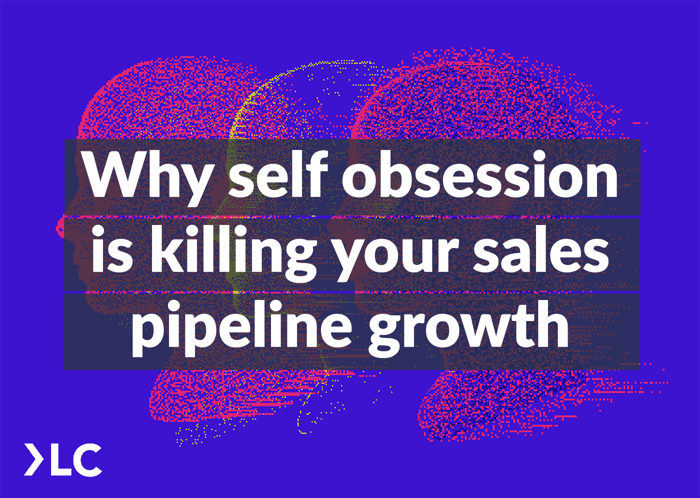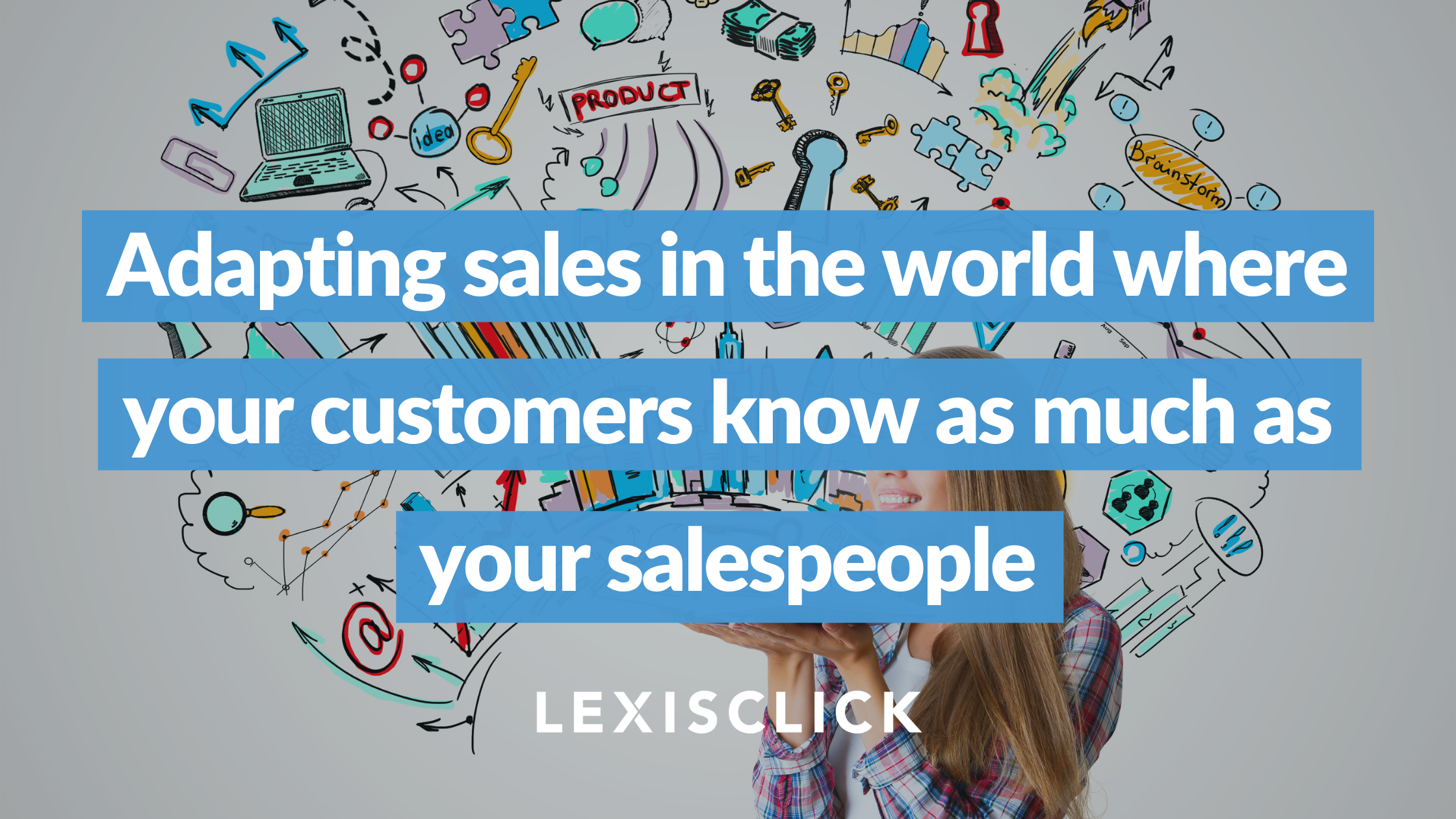
Ultimately what is the job of sales? Is it to hit their sales targets or to help customers buy? Businesses exist to serve their customers and customers don’t buy to help salespeople hit their targets, which means there is a fundamental problem with how sales is currently designed.
If you’re tight for time, bookmark this page and come back to it when you’ve got a spare 10 minutes to truly digest the information in this post.
The problem is that sales is self-obsessed
Think about it, what are the main points of discussion in your sales team? Are they discussing subjects like their:
- Revenue targets?
- Contact targets?
- Weekly productivity?
How often after you’ve been sold something by a salesperson, does that salesperson give you a call to find out how you are getting on and whether there is anything that they can help with? I bet that it’s hardly ever.
The chances are that in the run up to making your purchase you built trust with that salesperson and enjoyed speaking with them, which helped you decide to buy from them. Why after all that time and effort is put in by both sides do you never hear from them again?
The problem with this approach is that it is completely self-obsessed, there is no benefit in it for your customers. If your goal is to win long term customers, does this approach really make sense?

Sales has always been that way, why change it now?
I appreciate that for the last 100 years or so, sales has been targeted with winning new customers and generating revenue. It’s worked pretty well to date, so what’s the problem?
Great sales has always been about helping customers, look back through history and you’ll find plenty of examples. Unfortunately over time sales has been increasingly focused with the primary goal of generating new revenue which has taken the focus away from helping customers. With the combination of clever sales techniques and a world where people couldn’t share and access information in seconds, this approach has worked well in terms of generating revenue.
However, over the last 10 years things have changed massively with the information sharing power of the internet. Until very recently the sales people in any business were the gatekeepers of knowledge on buying from that business. They knew what the customer needed better than the customer ever could. The killer combo of holding all the information and clever sales methods meant that a skilled salesperson often had the upper hand over a prospect, making the process of buying a game of cat and mouse between buyer and seller.
Now your customers have at least as much knowledge as your salespeople all accessible in the palm of their hand. More often than not they’ll have researched extensively online, assessed all of your competitors and got the view of your existing customers, all before making contact with one of your sales team. Which means that the tables have turned.
Think about your recent purchases, how much research have you conducted before buying? You probably read countless web pages, reviews, watched videos and potentially chatted with existing customers all before making contact with the companies you’re planning to buy from.
The people who were the previous holders of all that knowledge, your sales team, now know no more and perhaps even less than the customer they are serving. So, what’s their role and are they even needed?
Yes, in many cases they are still needed but rather than making the sale at all costs, their role is now to help your ideal customers buy. With all their extensive research your customers can feel overwhelmed with their newfound knowledge, it can all be too much. They’ll be looking for reassurance they’re making the right choice, extra support with some of the fine details or that little bit of insider info to help them over the line.
If it’s a big purchase, they’ll want to know that they’ll be looked after when they become a customer and will be looking for clues on whether this will happen or not.
Adapting sales in the world where your customers know as much as your salespeople

Many businesses have realised that long term customers are the most valuable and it makes more sense to focus their efforts to attract and retain these ideal customers. It’s going to take time, but you’ll increasingly see sales teams rewarded for the long term customers they bring on board. It’ll be less about winning new customers at any cost and more about winning the right long term customers.
One of the benefits of sales is that it’s a direct human interaction at the front line with customers. Part of the role of sales is to break new ground and get feedback from customers to help better understand your ideal customers and what they need from you. This role will still be needed in business and it will become more closely integrated with marketing, product development and customer support. In some forward thinking teams there is already a blurring of the lines between these traditional departments and in some they’ve become fully integrated teams.
You’re likely to start seeing it become more common for businesses to merge their sales and customer services teams as increasingly intelligent and automated marketing will have removed much of the need for the traditional sales role. The sales skills will still be needed, but they’ll be focused on long term customer retention making a much more natural fit within or alongside the customer support function. And with much of the customer support role also being automated, both roles will be about providing a human touch and connection with customers rather than the heavy amount of administrative tasks still carried out by both roles today.
How can you change?
Look around and you’ll see that this change has already happened. How much of what you buy today requires no interaction with a sales person, compared with what that purchase looked like in the past?
If you haven’t started to adapt the role of your sales function already, it’s time to start now. Expect that your sales people will resist, especially if they’ve been in that position for some time, so you’ll need to help them adjust.
One of the first steps will be to look at how you define and target sales in your business. If you’re working in a traditional way, this will be one of the most significant changes. The easiest way to look at it is to simply reverse any internal facing (self-obsessed) targets and ask how can we change this so that it provides more value to our customers?
Here’s some suggestions of changes to make these targets more about your customers:
- New connections/contacts engagedvs New ideal contacts engaged
- Meetings/intros booked vs Problem identification meetings booked
- Meetings/intros taken place vs Ideal fit problems identified
- Number of proposals sent vs Ideal solution proposals provided
- New customers vs Ideal customers on-boarded
By making these changes you move the focus to providing an ideal solution to your ideal customer. When you do this, your sales team’s attention moves to customers that will receive the highest value from you, who will in turn highly value what you provide to them and as a result become high value long term customers.
You can assess how well your new business pipeline is designed to attract your ideal customers, by using the free Pipeline Scorecard that we’ve created.
How will you know when it's working?
You’ll know it’s working when your sales team is happier and you’re winning more long term customers.
Like with any change it’ll probably be hard at first and you’ll find yourself defaulting to old habits. However, the more you stick with it, the easier it will get.
You’ll start to see that the stress and challenges of constantly being self-obsessed will start to lift. Your sales team will be much happier helping your ideal prospects to make the right decisions, and your ideal prospects will feel this change too. You’ll see the shift from focusing on hitting targets and getting the sale at all costs, to helping the right customers make the right buying decision, will attract more long term customers to your business.
This long term thinking may have a short term impact on your new business sales revenues, but when you get to the renewal point and more of those customers stay with you, the benefits will really start to kick in.
On top of this your customers are much more likely to recommend your business and refer customers to you, which will compound the benefits.
It won’t be an overnight success story and may even look like you’ve taken a backwards step at first, but as you stick with it you’ll see the mid term benefits paying off and start to realise the huge long term benefits on your business.
The Customer Obsessed world
The world is increasingly moving in the Customer Obsessed direction. Look around, in today’s world it is the businesses that are providing the most value to their customers that are the most successful. As with any seismic shift in behaviour there will be inevitable bumps on the road, but the overall picture is a much better world for your customers.
It’ll also be a much better world for your sales team, who will get significantly more satisfaction from providing more value to your customers, compared with being targeted on how much revenue they generate for your business.


